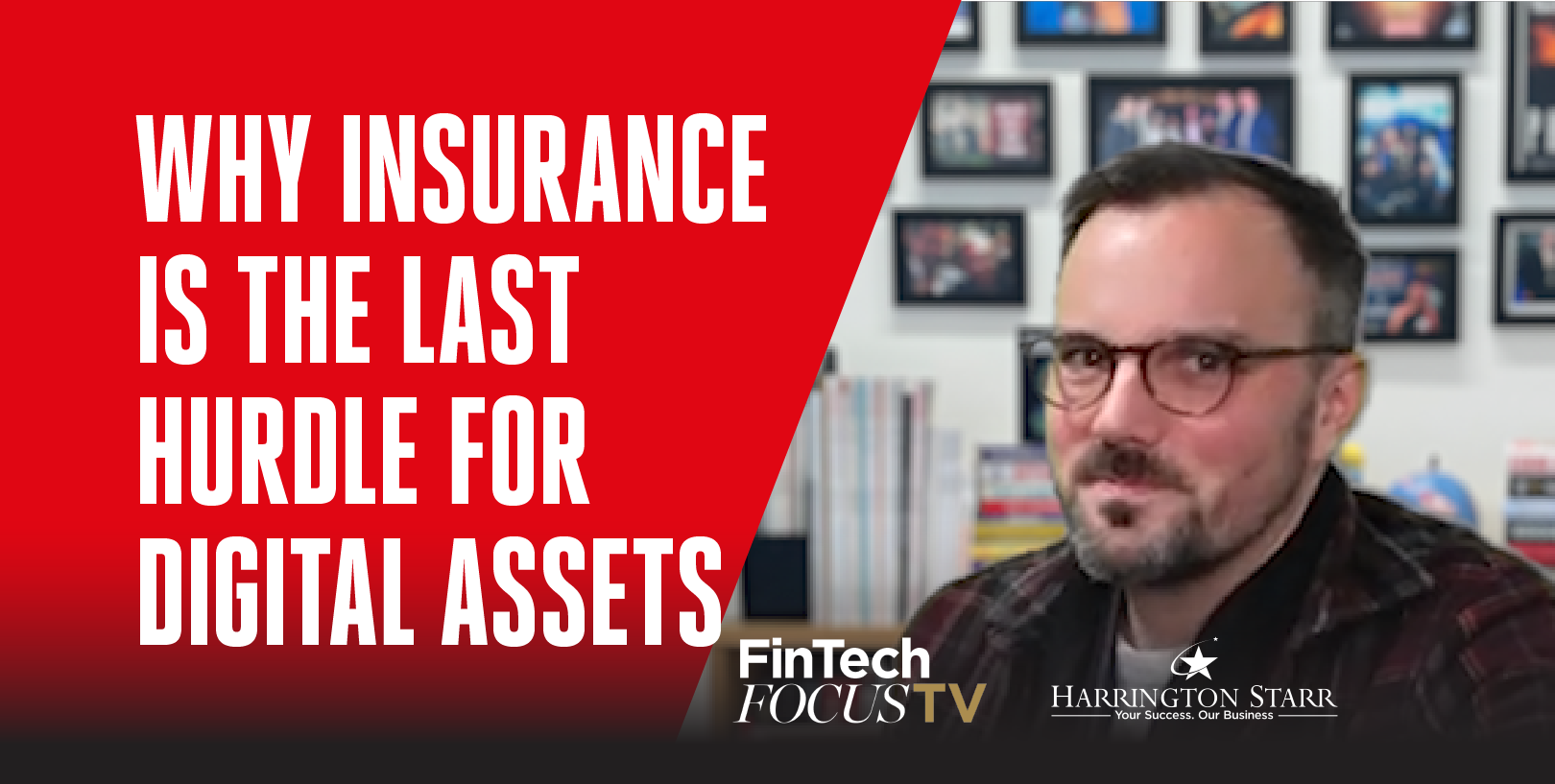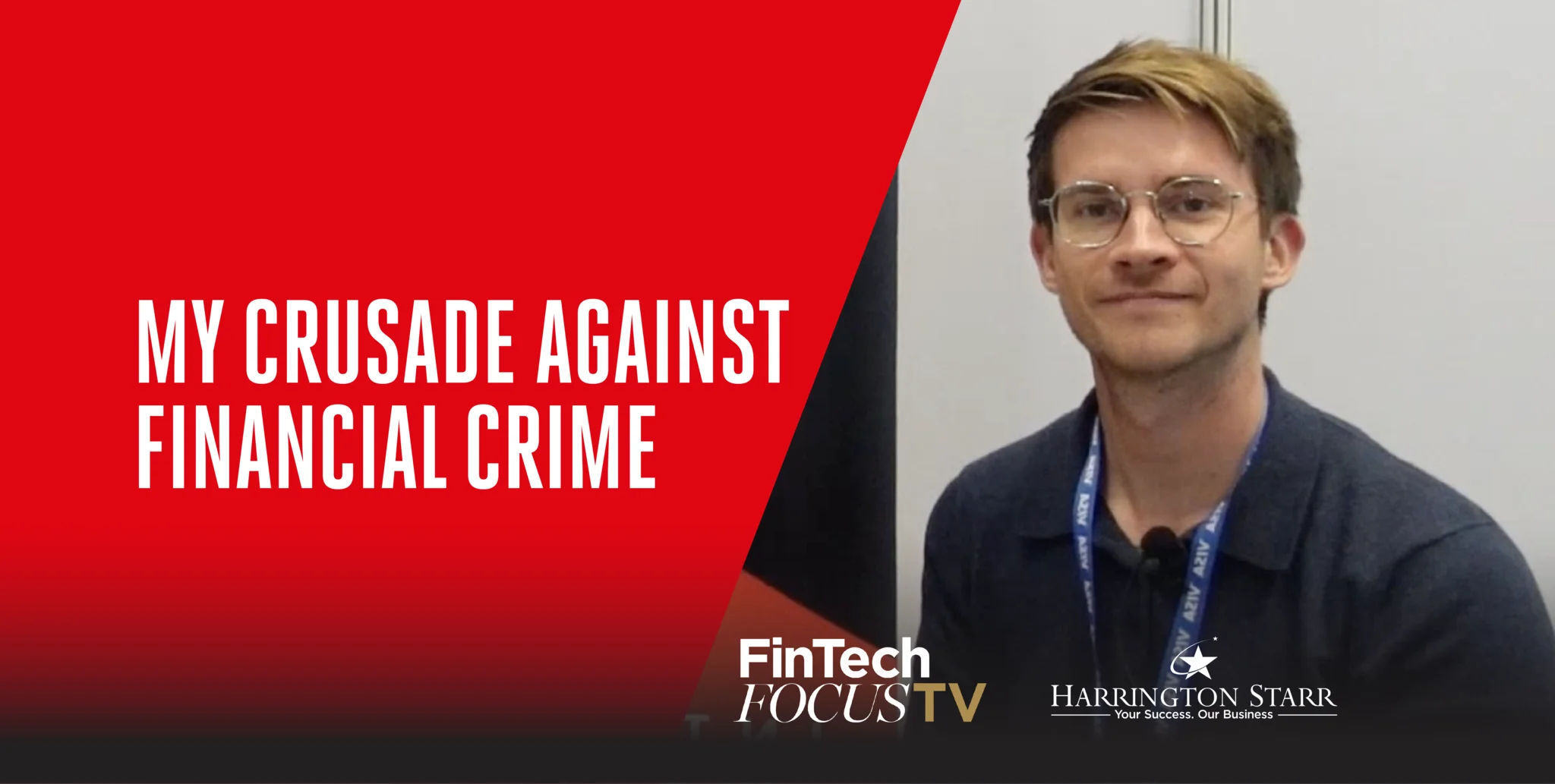
In the latest episode of FinTech Focus TV, Toby Babb, CEO of Harrington Starr, speaks with Ben Davis, CEO and Co-Founder of Native, to explore the compelling journey of innovation in the digital asset insurance space. This podcast episode exemplifies the intersection of entrepreneurship, risk management, and the growing importance of digital assets within the FinTech ecosystem.
Ben Davis’s Path from Insurance Broking to CEO
Ben Davis’s career journey is both inspiring and illustrative of the kind of resilience and vision required in the dynamic world of FinTech. Originally from Canada, Ben started his career in insurance broking, specifically focusing on non-profit organisations. He later moved to London and transitioned to underwriting at CFC Underwriting, where he managed professional indemnity for Canadian companies. These years provided Ben with an invaluable foundation in traditional insurance—an industry often characterised by its cautious pace and resistance to change.
The turning point in Ben career came in 2017 when he faced a serious health issue that required surgery. During his period of recovery, which left him unable to work or engage in daily activities, Ben stumbled upon a YouTube video that sparked his interest in blockchain technology. This initial exposure led him down a path of deep exploration—watching more videos, purchasing books, and beginning to invest in digital assets. This was more than a passing interest; it became a passion that would change the course of his professional life.
From Recovery to Product Management and Innovation
Product management is a crucial component of any successful FinTech business. For Ben, his recovery period acted as a catalyst for a significant career pivot. As he returned to work, his newfound interest in blockchain became a talking point, leading him to give presentations on the technology’s potential and the implications it held for risk management in the insurance sector. This shift marked the beginning of his foray into FinTech innovation, where he could blend his background in insurance with emerging technologies.
Ben co-founded his first venture, Coincover, focusing on providing blockchain protection for cryptocurrency holders. This startup laid the groundwork forBen’s belief in the potential for digital assets to transform the insurance landscape. His passion for creating innovative insurance solutions continued when he joined Superscript, a broker in London, as the head of their digital asset team. During his time there, Ben built a specialised team and expanded their portfolio to serve the growing needs of clients in the digital asset sector, setting the stage for the founding of Native.
Infrastructure Support and the Birth of Native
The inception of Native was born out of a clear understanding of the gaps in the current digital asset insurance market. Ben, alongside co-founder Dan Ross, evaluated the trajectory of the insurance industry in relation to blockchain and digital assets. They realised that while many insurers were hesitant or ill-prepared to tackle this rapidly evolving sector, there was a substantial demand for comprehensive, tailored insurance solutions. The digital asset space, with its ever-changing landscape, required infrastructure support that could only be provided by a company well-versed in both technology and risk management.
In their business planning, Ben and Dan took a long-term view, projecting what the market would look like over a five-year span. They foresaw the complexities of ensuring robust insurance policies that could cater to firms involved in FinTech recruitment, Network Engineering, and Quantitative Finance, among others. Recognising these needs, they knew that Native had to be positioned as an innovative leader capable of bridging the existing gaps in the insurance market.
Cyber Security and IT Risk in Digital Asset Insurance
One of the key themes discussed during the podcast was the critical role of Cyber Security and IT risk in digital asset insurance. Ben pointed out that many traditional insurers lacked the technical expertise to properly assess and underwrite digital assets. This shortfall often led to policies that were either insufficient or entirely unsuited for the needs of blockchain companies. The challenge of mitigating IT risk is especially pertinent for businesses handling substantial amounts of digital assets, where a single oversight could lead to significant financial losses or even a collapse.
Native approached this challenge by incorporating on-chain capabilities into their service offerings, setting themselves apart from more conventional brokers. This innovative approach allowed them to create insurance products that provided greater security and adaptability, crucial in an industry where technological advancements happen rapidly. This was backed by a significant investment from Nexus Mutual, which not only supported Native’s vision but also enabled them to offer more flexible, client-centric solutions. This was particularly important for areas like Cloud Engineering and DevOps, where companies often deal with complex, large-scale digital operations that require both agility and comprehensive protection.
Data-Driven Solutions and Strategic Partnerships
Data is the backbone of any successful FinTech enterprise, and Native’s strategy reflects that reality. During the podcast, Ben explained how partnerships and a data-driven approach were essential for Native’s expansion. Unlike many traditional sectors where insurance can be viewed with scepticism, the digital asset community was more receptive, understanding the critical importance of risk management. This unique openness provided Native with an opportunity to build meaningful partnerships that extended beyond client relationships to include strategic alliances with tech companies and service providers.
Ben spoke about the importance of leveraging data analytics to refine and develop insurance products. By collaborating with experts in Cloud Engineering, Infrastructure support, and Data analysis, Native was able to create solutions that were not only comprehensive but also adaptive to the unique needs of each client. This holistic approach is vital for businesses operating in complex sectors such as Quantitative Finance and Cyber Security, where understanding and mitigating risk requires in-depth data insights.
Meeting the Needs of the FinTech Recruitment Market
One of the standout aspects of Native’s approach is its relevance to various sectors within the FinTech recruitment market, including Product management, Network Engineering, and Software engineering. Ben discussed how traditional insurers often applied outdated policy structures to new-age problems, leaving significant gaps in coverage. This shortcoming was particularly problematic for crypto and blockchain firms that required comprehensive, flexible insurance policies to mitigate complex risks.
Native aimed to address these gaps by offering a modular, client-focused approach to policy design. Their deep understanding of the FinTech ecosystem allowed them to tailor solutions that matched the exact needs of their clients, which often included firms looking for robust Product management and Cyber Security solutions. This adaptability was key for companies seeking to manage IT risk while scaling their operations in fast-paced environments.
Challenges in Sales and Marketing for FinTech Firms
The podcast also highlighted the challenges Native faced in Sales and Marketing, particularly within the FinTech sector. Selling insurance in a volatile market like digital assets requires more than just a solid product; it requires a narrative that educates potential clients and builds trust. Ben detailed how Native’s marketing strategies included partnerships with key media outlets such as CoinDesk and active engagement on LinkedIn, which helped them reach a broader audience and establish credibility.
Sales and Marketing in the FinTech space must be strategic and deeply aligned with the industry’s needs. For companies in areas such as Network Engineering, Quantitative Finance, and Cloud Engineering, understanding the nuances of digital asset insurance is essential. Native’s approach combined traditional sales techniques with modern marketing efforts to ensure that they reached the right audience effectively.
The Role of Software Engineering in Digital Asset Insurance
Ben also touched on the importance of Software engineering in supporting Native’s unique offerings. Developing on-chain capabilities required a skilled team with a deep understanding of both blockchain technology and the principles of insurance. This expertise allowed Native to automate processes such as the issuance of certificates of insurance on the blockchain, a feature that set them apart from traditional brokers.
This technological edge was especially valuable for clients in Software engineering and Infrastructure support, where efficiency and transparency are paramount. The integration of advanced software solutions not only streamlined Native’s internal processes but also provided clients with a seamless experience. By utilising blockchain for certain operational aspects, Native offered an additional layer of security and trust that was highly valued in the digital asset community.
The Community-Centric Approach and Future of Native
A recurring theme throughout the conversation was the importance of community. Ben emphasised that Native’s success was built on the support and collaboration of the broader digital asset ecosystem. This community-focused approach is reflective of the cooperative nature seen in many blockchain initiatives and is a departure from the more isolated strategies of traditional insurers.
Partnerships with crypto firms, investors, and even competitors were central to Native’s rapid growth. The company’s vision extended beyond profit; it aimed to contribute positively to the entire ecosystem by providing essential infrastructure support that enabled other digital asset companies to thrive. Ben shared stories of early support from stakeholders who believed in Native’s mission, demonstrating the strength of their community ties.
Looking ahead, Ben predicted a significant shift in how digital asset insurance policies would be structured. The current approach, which often involves shoehorning digital assets into existing policy templates, would give way to more comprehensive, modular policies that cater directly to the needs of digital asset firms. This evolution would require more insurers to enter the market, bringing their own expertise in areas such as Cyber Security and IT risk, further broadening the scope and depth of available insurance solutions.
Conclusion
This episode of FinTech Focus TV not only delves into the intricate world of digital asset insurance but also highlights the broader implications for FinTech recruitment and related sectors. Companies within this space are increasingly in need of talent skilled in Cloud Engineering and DevOps, Data analysis, Software engineering, and other tech-centric areas to navigate the evolving landscape of digital assets and blockchain.
For businesses looking to scale and innovate, having the right team in place is critical. Harrington Starr, as a leading FinTech recruitment agency, understands these needs and aims to connect companies with the talent that can help them adapt to and thrive in this fast-changing environment. The insights from this episode underscore the importance of staying ahead of industry trends, investing in technology, and building robust partnerships—all of which are essential for long term success in the FinTech sector. By aligning strategic recruitment with industry demands, businesses can position themselves to effectively manage challenges in areas such as Cloud Engineering and DevOps, Cyber Security and IT risk, and Software engineering. The ability to scale with skilled professionals ensures that companies remain competitive, resilient, and prepared to seize new opportunities in an ever-evolving technological landscape. Harrington Starr’s dedication to matching businesses with top talent is key to fostering growth, innovation, and sustainable success in this dynamic field.





